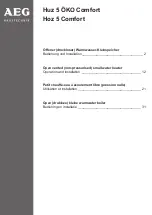
WL400
Manual Page 49 – Revision: 7‐16‐2018
PRE‐INSTALLATION PROCEDURES
DANGER!
ELECTRICAL SHOCK HAZARD.
Only qualified personnel who have read and understand this entire manual should attempt to
install, or service this unit, failure to do so could result in death or serious injury.
WARNING!
ALWAYS SANITIZE BEFORE USE.
Sanitize before use to eliminate any potential microbiological contaminates.
Green Compressor/Heater Switch must be in the O=OFF position while the Hot
Tank is empty. Damage could occur within one minute and the two Hot Tank
Overload Devices (High Safety Limit) require manual reset if heater is turned on
with an empty Hot Tank.
CAUTION!
DRIP TRAY DRAIN.
If you intend to provide a drip tray drain for your customer, be aware that you
will be called multiple times per month to service and unclog the tubing leading
away from the drip tray to drain. Users will clog the drain with paper clips,
erasers, napkins, tea bags, gum, and various other intended items. Waterlogic
recommends you establish a minimum of weekly visits to the machine for
cleaning of the drip tray drain.
Sanitization of Machine
Materials Needed:
Personal Protective Equipment. Rubber or Nitrile Safety Gloves and Protective Eyewear
Phillips Screwdriver
Temperature Gauge
Water Pitcher or Container to collect water from the faucet
5‐gallon container or drain basin
Sanitizer ‐ Household Bleach (5.25% Sodium Hypochlorite) or Citric Acid Based Cleaner
¼” Plastic Tubing, at least 4 feet in length, and assorted ¼” quick connect fittings
TDS Meter and Test Strips for measuring chlorine – Optional
Sanitizing Cartridge
1.
Unpack the
Waterlogic WL400
and check exterior for damage.
Sanitize using a Household Bleach (5.25% Sodium Hypochlorite solution) or other approved
cleaner throughout the cold and sparkling water circuits. Follow all instructions on the sanitizer
and flush with fresh water through the faucet until odor and taste is acceptable.
WARNING!
USE PROPER PERSONAL PROTECTIVE EQUIPMENT
Always ensure proper ventilation and use proper personal protective equipment such as gloves
and eye protection when using chemicals. Refer to Material Safety Data Sheet for specific
requirements of each chemical product. Take all necessary precautions to prevent sanitizer from
contacting eyes, clothing, and any other surfaces in could damage (carpets).
































